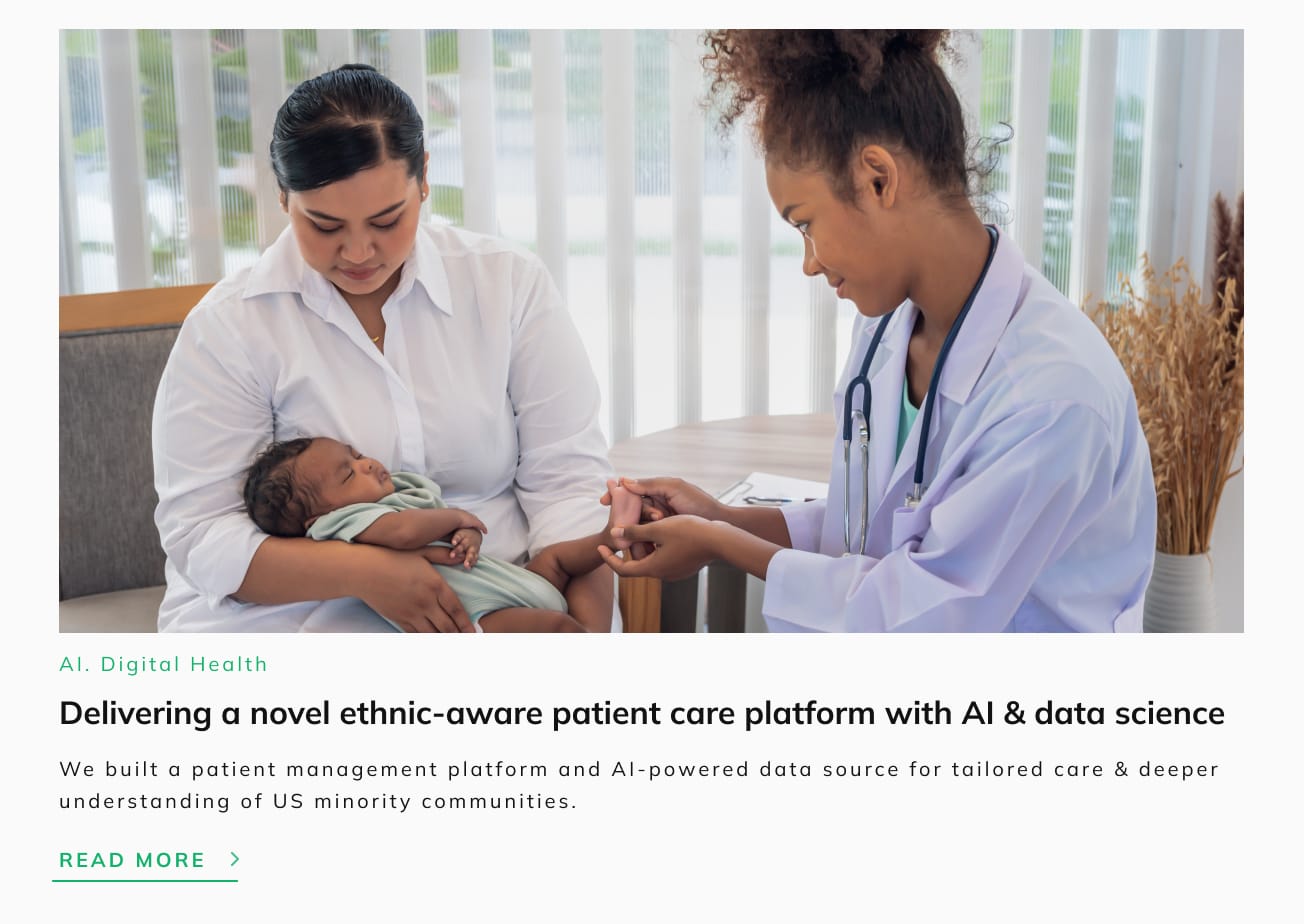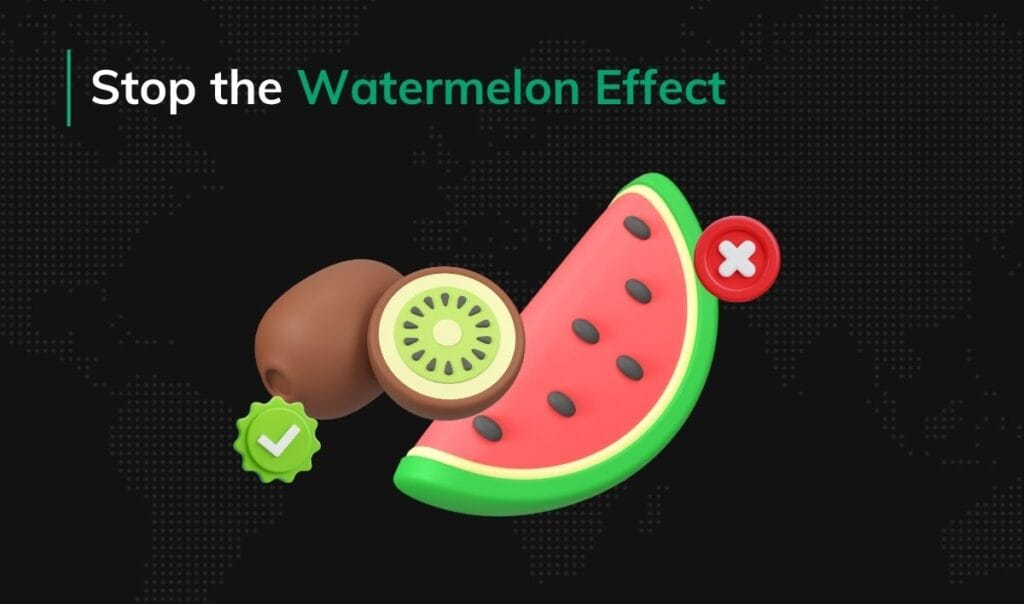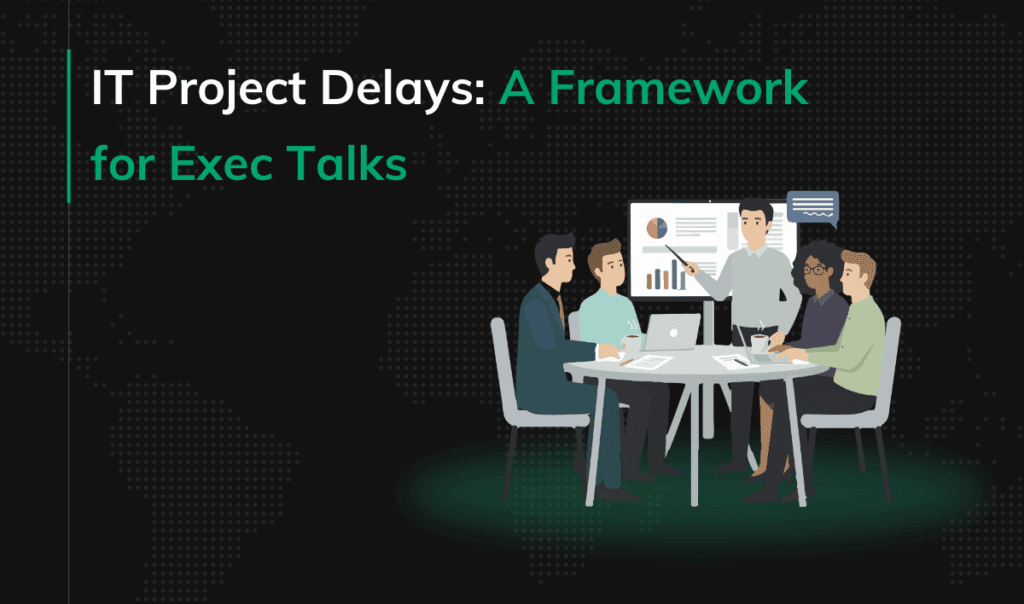Guide to personalization in healthcare apps
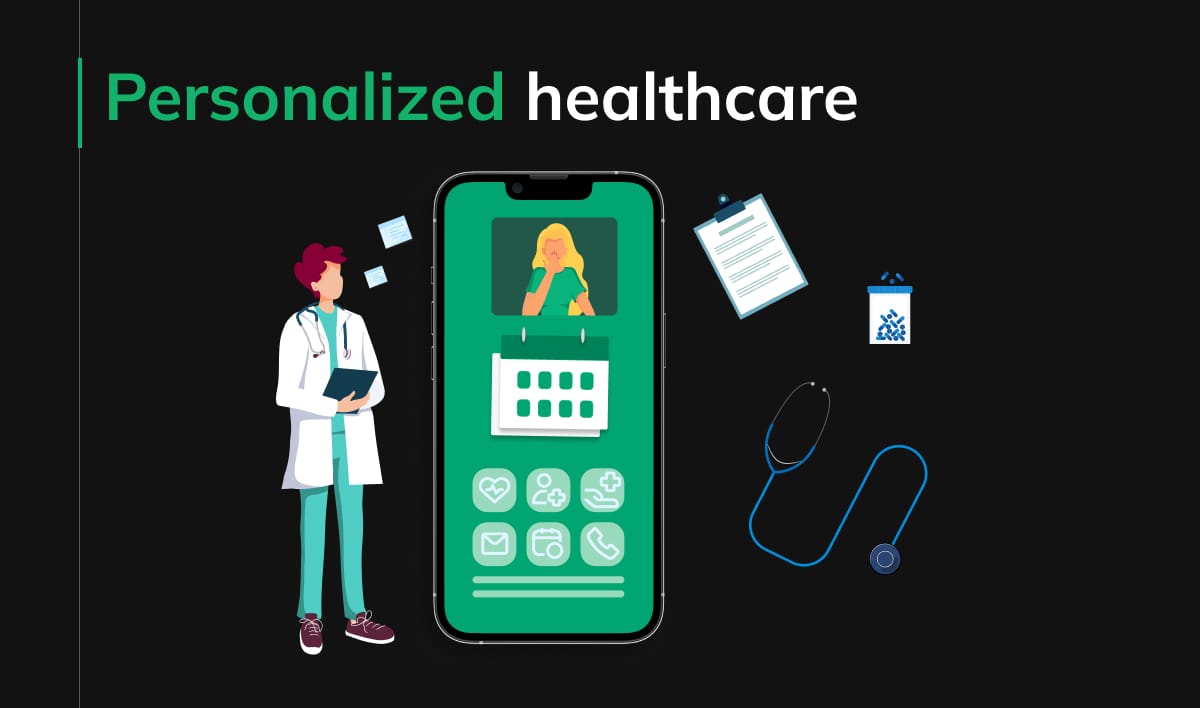
Personalized healthcare is crucial for patient-focused and effective medical services.
The COVID-19 pandemic has accelerated the shift to digital healthcare, highlighting the need for tailored care.
Let’s explore how technology can customize healthcare experiences, improve patient outcomes, and support a sustainable healthcare system.
What is personalization in healthcare technology?
Personalization is tailoring a product to a user’s preferences or needs. In healthcare: to an individual’s unique needs, genetics, and lifestyle.
In the case of more advanced health technology, we can even talk about hyper-personalization.
- Hyper-personalization uses advanced data analysis, artificial intelligence (AI), and machine learning (ML) to create deeply tailored experiences. Unlike traditional personalization, which may rely on basic user information, hyper-personalization integrates comprehensive data points, including user behavior, preferences, and real-time interactions, to provide a more individualized experience.
Why is personalization becoming “the thing” in healthcare?
There are a few reasons why personalization is becoming one of the next go-to strategies for creating healthcare software.
We can distinguish at least five key trends in healthcare that are contributing to the rise of personalized healthcare software:
Digital transformation
Firstly, the general digital transformation trend. The COVID-19 pandemic pushed healthcare to rapidly adopt digital solutions like virtual care and remote monitoring to continue providing care. These digital solutions offer convenience, affordability and better outcomes for both patients and providers.
The future of healthcare is digital, with patients demanding a more convenient experience, and more providers are expected to move towards digital healthcare delivery.
Patient-owned health data (POHD)
Patient-owned health data (POHD) is emerging as a significant digital health trend.
POHD refers to the concept that individuals have ownership or control over their personal health information. This includes data collected by healthcare providers like doctors and hospitals, as well as data you generate yourself, like fitness tracker information or health apps.
The concept of POHD puts patients in the driver’s seat of their healthcare and allows for customized treatment plans; it’s predicted to play a pivotal role in shaping the future of eHealth.
“Prevention is better than cure” & whole person care approaches
Modern healthcare is embracing a more comprehensive approach called whole-person care, considering not just physical health but also mental well-being, social determinants, or quality of life–the so-called social determinants of health (SDOH).
Factors like the rise of patients with multiple chronic conditions and the growing impact of social determinants of health drive this data-driven shift in healthcare. AI is playing a crucial role in this transformation.
By analyzing data from various sources, AI can predict health risks, personalize treatments, and identify patients who need the most help. This allows healthcare providers to move from simply treating illnesses to proactively preventing them.
Shoppable health
According to Capgemini’s research, patients are demanding a more user-friendly, Amazon-like, shoppable, and personalized healthcare experience, similar to what they get with other digital services. And with new rules in the US (The Interoperability and Patient Access Final Rules) sharing health data between patients, providers, and insurance companies has become easier than ever before.
The development of AI
AI and machine learning (AI & ML) personalize experiences by analyzing user data to predict preferences and recommend relevant content. This technology can leverage vast amounts of medical data to tailor treatments and interventions to individual patients – just a few examples of its potential applications.
Learn more: Healthcare trends 2023-2030. Guidelines for healthcare app founders
Personalization in healthcare apps
To explore what personalization might look like in healthcare apps, let’s first define “healthcare app”.
A healthcare app (also sometimes called a health app or mHealth app) is, according to Gemini, a software application designed for smartphones, tablets, and other mobile devices to address various health-related needs.
Quite a wide definition, isn’t it? It can include both fitness apps like Fitbit or patient portal software used by healthcare organizations to manage their patients.
Differences in personalization
In the case of personalization, access to data is key.
I mentioned how vague the definition above is for a reason: consumer apps and business apps will vary significantly in the user data they can access. Thus, the way user experience can be personalized for each app type will vary, too.
For example, fitness apps typically collect basic information like weight, height, and physical activity (if connected to wearables).
Medical business apps like patient portals, on the other hand, are designed to let patients manage their health information and communicate with their doctor’s office. The data they contain (your medical records, doctor visit summaries, medications, lab results, immunization history, etc.) is far more comprehensive.
Personalization is important for both consumer and business-oriented healthcare apps, but it serves different purposes and takes on different forms.
Key differences in personalization:
- Focus: Commercial apps personalize for user engagement and satisfaction, while business apps personalize for improved healthcare outcomes and patient experience.
- Data source: Commercial apps rely heavily on user behavior and preferences, while business apps leverage medical data.
- Benefits: Commercial apps personalize for enjoyment and keep users coming back. Business apps personalize to empower patients and improve healthcare delivery.
Let’s examine this in more detail (we’ll stick to the fitness app/patient portal example).
Personalization in healthcare consumer apps
Consumer apps are software applications designed for individual users to meet their everyday needs, like shopping, socializing, entertainment–or health management. They cater to a large, general audience with a focus on attracting and keeping users engaged. You’ll find these apps in public app stores; they make money through in-app purchases, ads, or freemium models.
In terms of digital health, consumer apps would be, for example, fitness apps, nutrition and diet apps, mental health apps, sleep tracking apps, women’s health apps, or weight loss apps.
Commercial app: Fitness app
- Goal of personalization: Keep users engaged and motivated to reach their fitness goals.
- Data used: Fitness data (steps, calories burned, workouts), preferences (favorite exercise types), goals (weight loss, muscle gain), and user behavior (time of day workouts happen, frequency of use).
- Examples of personalization:
- Tailored workouts: Based on user data, the app suggests personalized workout plans that consider fitness level, goals, and preferences.
- Adaptive challenges: A little bit of personalized gamification tracks user progress and adjusts challenges to keep them motivated.
- Nutritional guidance: Recommends recipes or dietary adjustments based on calorie goals and workout intensity.
- Product recommendations: Recommend fitness and nutrition products that complement a user’s workout routine and goals.
Personalization in healthcare business apps
Business apps are built for specific organizations, they target a defined group with work-related needs. Their goal is to improve internal efficiency, streamline processes, and boost productivity. These apps might be custom-made or obtained from specialized business app stores. Unlike commercial apps, they charge licensing fees, subscriptions, or come bundled with other software.
Examples include electronic health records (EHR) and electronic medical records (EMR), practice management software, medical billing and coding software, telemedicine and telehealth software, patient portals, etc.
Business app: Patient portal
- Goal of personalization: Improve patient experience and healthcare outcomes.
- Data used: Medical history, medications, appointment history, lab results, and patient-reported outcomes (symptoms, pain levels).
- Examples of personalization:
- Customized dashboards: Highlight relevant information like upcoming appointments, medication reminders, and personalized health goals based on your medical conditions and social factors.
- Secure messaging: Allow secure communication with doctors or care teams tailored to individual needs.
- Medication management: Personalized medication reminders and refill options.
Check: 15 types of medical software
Benefits of personalization in healthcare
Personalization serves both patients and healthcare organizations that implement it.
For consumers, personalized health care is valuable because it results in greater consumer satisfaction (as targeted interactions improve the overall healthcare experience) and improved quality of care with lower costs.
For organizations, personalization leads to revenue growth–a highly personalized product becomes more competitive which positively impacts patient acquisition. What’s more, member retention along with customer lifetime value also increases.
Here are some specific personalization benefits from Boston Consulting Group’s research. Within a timeframe of 6 to 12 months, some payers who have adopted personalization have reported:
- 10% increase in customer satisfaction,
- 5% to 10% reduction in administrative costs,
- 20% to 25% improvement in quality standards.
- Substantial gains in consumer satisfaction, shorter hospital stays, and fewer 30-day readmissions.

How to build a personalization engine for healthcare apps?
To create an effective personalization engine for your healthcare app, you can follow these key steps as proposed by BCG:
Build a solid data repository
Start by creating a secure, robust data repository to gather and store all essential patient information. This should include demographic details, medical history, treatment plans, and patient interactions.
Make sure the data is well-organized and easy to access for analysis while strictly following healthcare data regulations.
Use machine learning for targeting
Leverage machine learning to dive into the data and uncover patterns. These insights will help predict patient needs and preferences, leading to personalized recommendations and interventions. Machine learning models can group patients into specific segments, optimizing how you engage with them.
Automate system actions
Combine machine learning with a rule-based system to send personalized messages through the best channels at the right times.
The system will select the level of touchpoint for communication (high touchpoints: outbound calls, secure messaging, video consultations, or personalized appointment reminders, low touchpoints: emails, text messages, app notifications, and newsletters.)
Experiment and measure
- Run A/B tests and multivariate tests to see which personalization strategies work best.
- Implement a feedback mechanism to gather user insights and continuously improve the system based on real-world results.
Build a strong tech infrastructure
Use cloud technology for scalability, flexibility, and security. A cloud-based setup allows for efficient data processing and storage, which is key for real-time personalization.
Refining your personalization engine
- Assess your organization’s maturity: Check where your organization stands in terms of the five key elements.
- Develop a roadmap: Create a step-by-step plan with a timeline to achieve full personalization capabilities.
- Agile development: Set up an Agile team to iteratively design, develop, and deploy enhancements to the personalization engine. Continuously test and refine the system to meet evolving patient needs and technological advancements.
By following these steps, your healthcare app can deliver highly personalized experiences, boosting patient engagement and outcomes.
How Pragmatic Coders can help you personalize your users’ healthcare experience
We understand the importance of personalization in healthcare.
In one of our healthcare projects, we developed an AI-powered patient care platform focused on ethnic minorities. The project involved creating a patient management platform and a comprehensive data source. The platform aims to improve personalized care and operational efficiency for minority communities.
This is just a glimpse into what we can achieve to personalize the healthcare experience for your app users.
Learn more about the project below: Personalization in patient portals [CASE STUDY]
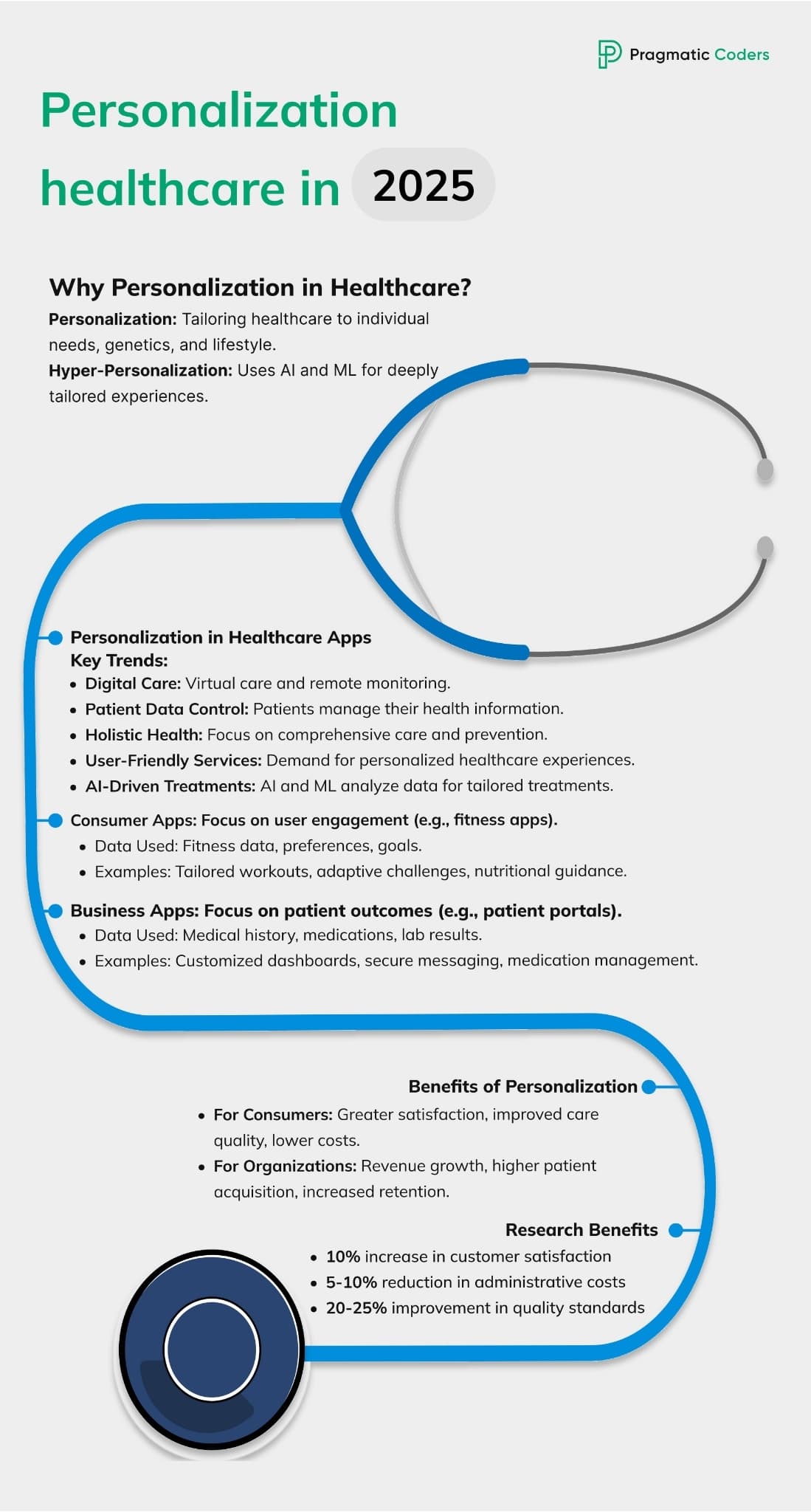
Conclusion
Personalization is revolutionizing healthcare by making it more patient-centered and efficient.
As digital health technology continues to advance, the integration of AI, ML, and IoT in healthcare apps will further enhance the ability to provide personalized, real-time health solutions, ultimately leading to better patient outcomes and more efficient healthcare systems.
It could take a few years for you to achieve expertise in healthcare personalization. However, the right team with proven experience can deliver value in months.
Contact us now & see personalization bring immediate results.


